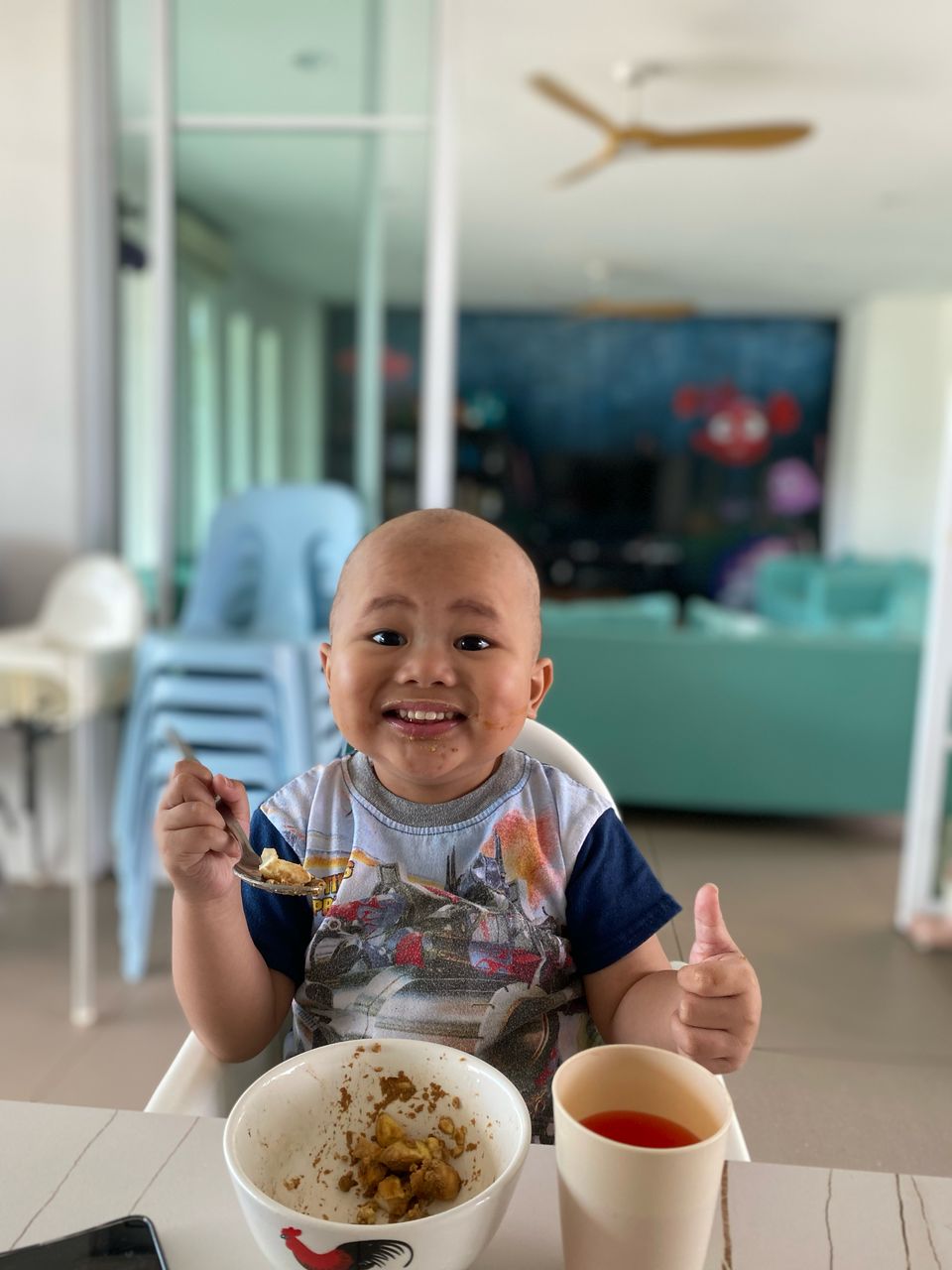
Aqil, a cheerful boy who loves chicken, hotdogs and broccoli, spends his days playing with Legos and wearing his favourite superhero clothes. His mother shares their family’s journey through childhood cancer:
The First Signs
Aqil, my second child, was always a bundle of joy—an active little boy with a hearty appetite. But gradually, things began to change.
I noticed Aqil becoming increasingly lethargic with recurring fevers that wouldn’t break. Mosquito bites would continue bleeding longer than normal, and when he fell and hit his head one day, it immediately turned red and left a substantial bruise.
At first, we simply got Panadol syrup from the pharmacy, assuming it was just a common cold. After two weeks without improvement, we grew concerned. His stomach started to bloat, his gums bled, and his skin developed a yellowish tint.
We took him to a local clinic, but when his condition didn’t improve after the initial visit, we returned. The doctor then referred us to Hospital Miri for more thorough testing. On January 9, 2024, we received the diagnosis: Pre-B Cell Acute Lymphoblastic Leukemia. We needed to travel to Kuching immediately to begin chemotherapy.
Balancing Family Needs
I was pregnant with my youngest child when Aqil was diagnosed, and it was very near the expected due date. The timing couldn’t have been more challenging—I was in the final weeks of pregnancy with my youngest child. Aqil’s father planned to accompany him to Kuching, but a positive COVID-19 test prevented this. Thankfully, my sister stepped in to care for Aqil during the initial treatment phase.
Every day was filled with worry about Aqil while he underwent treatment in Kuching. After giving birth, I struggled to focus on my newborn, my mind constantly drawn to Aqil’s condition. I could barely sleep or rest properly during my confinement period because of this.
Once my confinement ended, I was determined to take over Aqil’s care in Kuching. My sister initially resisted, concerned it would be overwhelming for me, but I persisted. My infant, who was not yet three months old, remained in Miri under my sister’s care.
Facing Challenges

The most difficult moment came when I arrived at Sarawak General Hospital. The doctors informed me that Aqil’s condition had progressed from standard to high risk because cancer cells remained after his initial intrathecal treatment. They needed to switch him to stronger medication.
Fear gripped me—Aqil was so young, and the thought of losing him before he had a chance to grow up was unbearable. Despite these thoughts, I tried to stay strong for him.
Aqil, though young, was a perceptive young boy. He could always sense it when I was upset, so I hid away and cried in the bathroom instead. Whenever he caught me crying, he would ask why. I reminded myself daily that I needed to maintain strength for his sake.
Community Support
Without family in Kuching, the SCCS Halfway Home Centre became our lifeline. There, we found accommodation, daily necessities, transportation to the hospital, and financial assistance.
The monthly parents’ support group organised by the SCCS team provided crucial emotional support, helping me process our situation while my other children remained in Miri. Hearing other parents’ experiences made me feel less isolated and gave me hope. I gradually realised that Aqil’s diagnosis wasn’t the end of our story.

During his treatment with Dexamethasone, Aqil would occasionally have small disagreements with other children at the centre, but they would quickly make amends.


Xin Yi from the SCCS Support team noted my initial shyness: “She was quiet when she first arrived, mostly keeping to herself. She had just learned that Aqil’s initial medication wasn’t working, which naturally caused her significant stress.”
“Aqil’s personality changed noticeably when taking Dexamethasone,” Xin Yi added. “He became moody and quick-tempered. But he loved playing with Lego and was fascinated by Spiderman and other superheroes. When not on medication, he was incredibly sweet and always carried his little backpack filled with snacks.”
Shu Shan, the support group counsellor, observed: “The parent support group really seemed to help Mak Aqil during her time in Kuching. Hearing other mothers share their experiences appeared to provide comfort.”
Recovery and Homecoming
Gradually, Aqil’s condition improved. Before treatment, he always looked tired, but I was relieved to see him returning to his healthier, more energetic self. Our treatment journey took longer than expected due to the need to adjust his medication approach.
In November 2024, Aqil was cleared to return home, though we’ll continue follow-up appointments at Miri Hospital.

I anticipate new challenges ahead—caring for three children will be different from focusing solely on Aqil. With my husband in Bintulu looking after our oldest, and my sister and parents helping with my youngest and Aqil’s hospital visits, we’re building a supportive rhythm together. The adjustment requires patience, but I find myself looking forward to the moments when our family can simply be together again, creating our new normal.
To parents facing similar journeys, I’d like to offer this advice: Don’t compare your child with other children. Every child’s treatment and condition are different, and we should never compare our child with others because we can’t feel what they are going through after receiving chemotherapy treatment.
Your donation is supporting kids like Aqil on their cancer-fighting journey. From as low as only RM30/month, you can help kids fight cancer!
Sign up today for our Heart of Gold Monthly Donation Programme to help ensure children with cancer get access to the medical treatment and care they need to get better.
Childhood cancer is treatable, and your support can help save their lives.
